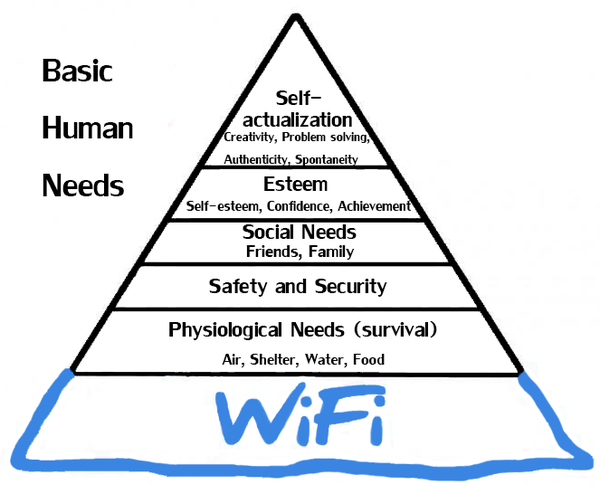In the study, scientists put the three plastic compounds into ‘hard water’ — a common type of U.S. freshwater that contains high levels of calcium carbonate and magnesium
When the plastic-containing water was boiled, these calcium carbonates formed tiny clumps around most of the microscopic plastics, trapping them within and rendering them harmless.
The report comes with significant caveats, however.
Scientists only looked at three of the most common — and in the case of polyethylene and polypropylenes, the safest — plastic polymers. They didn’t look at vinyl chloride, for example, a compound of serious concern last month’s study found in bottled water.
Boiling also didn’t manage to remove all of the polymers.
Removed by mod
Reminds me of the amended version of Maslow’s hierarchy:

Considering how much plastics is in candy, gum, etc, it might as well be
That sounds like a great money-making scheme for the FDA as the lobbyists for each of the food groups push for becoming the bottom of the pyramid.
Holy shit!! This is great news. Hey - if we just raise temperatures globally, that could solve our micro plastics problem. Now… How do we get the ball rolling on this new “global warming” idea?
Ahh, as someone who dislikes winter and cold, I look forward to seeing the oceans boil.
As long as the plastic manufacturers pay for it.
That’s going to happen, right?
…
Right?
Reads like a four panel annakin meme.
So basically it doesn’t really work on all the plastics and you have to have hard water for encapsulating the plastic with minerals for it to work.
I wonder how effective the standard small filters are against microplastics? I had assumed they likely dealt with a lot of the problem already but I suspect a Zerowater big filter is very effective against microplastics given it removes all dissolved solids. It is at least a personal solution to reduce the impact of microplastics in drinking water but its not going to solve it coming in every food.
I wonder as well. My filter is made of plastic, and my water lines are plastic. Sometimes my cup is plastic. Do I get more micro plastics after the filtration process?
Of course, unreacted monomers are present in all plastic. It’s a question of how many and how harmful they are.
I was also thinking similar, does puttingan RO system for just the drinking water solve this?
Yes most definitely.
Micro plastics are defined as plastic sizes from 5mm down to 1.6 Microns.
A typical consumer grade RO can easily filter down to 0.001 Microns. Which not only removes micro plastics but almost all bacteria and viruses as well.
Would you look at that! We’re on the path to a self-solving problem! Once global warming causes the oceans to boil, all the microplastics will bind to the calcium! We’d have to rename the oceans “cioppino” cuz of all the cooked marine animals, but also we’d be dead, so win-win?
I mean the ocean is just a giant soup anyway since it has meat, veggies and seasoning… why NOT boil it?
Oh yeah we’d all die
Death by soupification
This is 100% stupid. Distilling by boiling would be a way to remove particulate. Boiling a thing that can break down into microscopic particles…no.
I suppose the question is which would use less energy: boiling to distill, or boiling just enough to bind the microplastics to the calcium and then filter the now easy-to-remove large particles.
deleted by creator
I’m not sure if there is an effective solution on small scales with reducing the inputs (like buying bottled water to add calcifers and boil is an huge waste of effort to me) but on larger scales this could be useful before introducing water into a water system or activity fighting micro plastic build up in bodies of water conducive to this.
wondering how this would work in solar/uv heating in existing treatment systems





